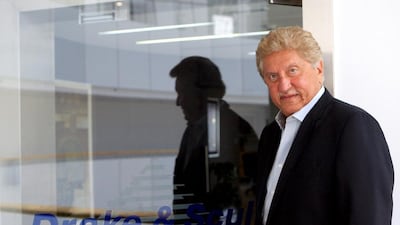The former chief executive of Dubai-based contractor Drake & Scull International claims the company’s current management is undertaking a “smear campaign” as they pursue a series of claims against him through the courts.
Khaldoun Tabari, who headed up DSI from 1998 – before the company's 2008 flotation on the Dubai Financial Market — until August 2016, said the claims filed against him by DSI are “entirely unfounded” and can easily be refuted by evidence he says has been made available to UAE authorities.
“Even a cursory examination of the unfounded allegations made by DSI shows that they are unwarranted commercial claims and not criminal complaints,” Mr Tabari said in a statement. “These claims have also been accompanied by a smear campaign that is feeding misinformation to the media, further underscoring the questionable tactics employed by DSI’s new management throughout this process.”
A spokesman for DSI said in response to Mr Tabari's claim of a smear campaign that the company has "only disclosed facts regarding the legal cases and complaints filed against Mr Tabari, his family members and former executive managers".
"Mr. Tabari is charged by the Abu Dhabi Public Fund Prosecutor with misappropriation, fraud, embezzlement, intentional damage to public funds, profiteering others and forgery. These serious charges have led to his arrest by Jordanian authorities at Queen Alia International Airport in Amman following an International arrest warrant filed by UAE authorities," the spokesman said.
"After arresting him in Jordan a criminal case was filed against him in Jordan by the Public Prosecutor before the criminal court in Jordan registered under number 799/2020 which is related to the Interpol warrant. These are all facts," the spokesman added.
The spokesman reiterated a recent statement made by the company's chairman stating that it had a duty to protect the rights of its shareholders.
"DSI will pursue everyone who was involved and is proven guilty of jeopardising in any manner the best interests of our shareholders."
Mr Tabari told The National that unbeknown to him (as he is no longer in the UAE), he had been summoned by a District Attorney in the Emirates to appear for questioning in December. When he failed to appear a notice was issued, via the Arab branch of Interpol, to summon him for questioning, he said.
The Jordanian, who has remained outside the Emirates since an order issued from the Central Bank of the UAE in June 2018 froze his local accounts and a travel ban was imposed following complaints from DSI, said to his knowledge no formal charges have been brought against him. A committee established to investigate the company’s claims against him, with whom his lawyer has been co-operating, has yet to release its findings, he added.
Mr Tabari has filed a motion through a legal consultant in the UAE “to object to the legality of the procedures that have targeted him to date”, he said in his statement.
He denied all allegations of corruption, and said that during each of the eight years he served as chief executive of DSI as a listed entity, the company's accounts were subject to scrutiny by auditors and required approval from its board and shareholders’ general assemblies.
He argued the losses incurred until his departure were properly accounted for.
'We took contracts that with the downfall of oil and the general conditions, we started haemorrhaging. So we had cash flow problems. It is not inconceivable that you make decisions — at the board level — and you try to do things and the current goes against you," he told The National.
“So we incurred losses. This was clearly in our balance sheet.”


